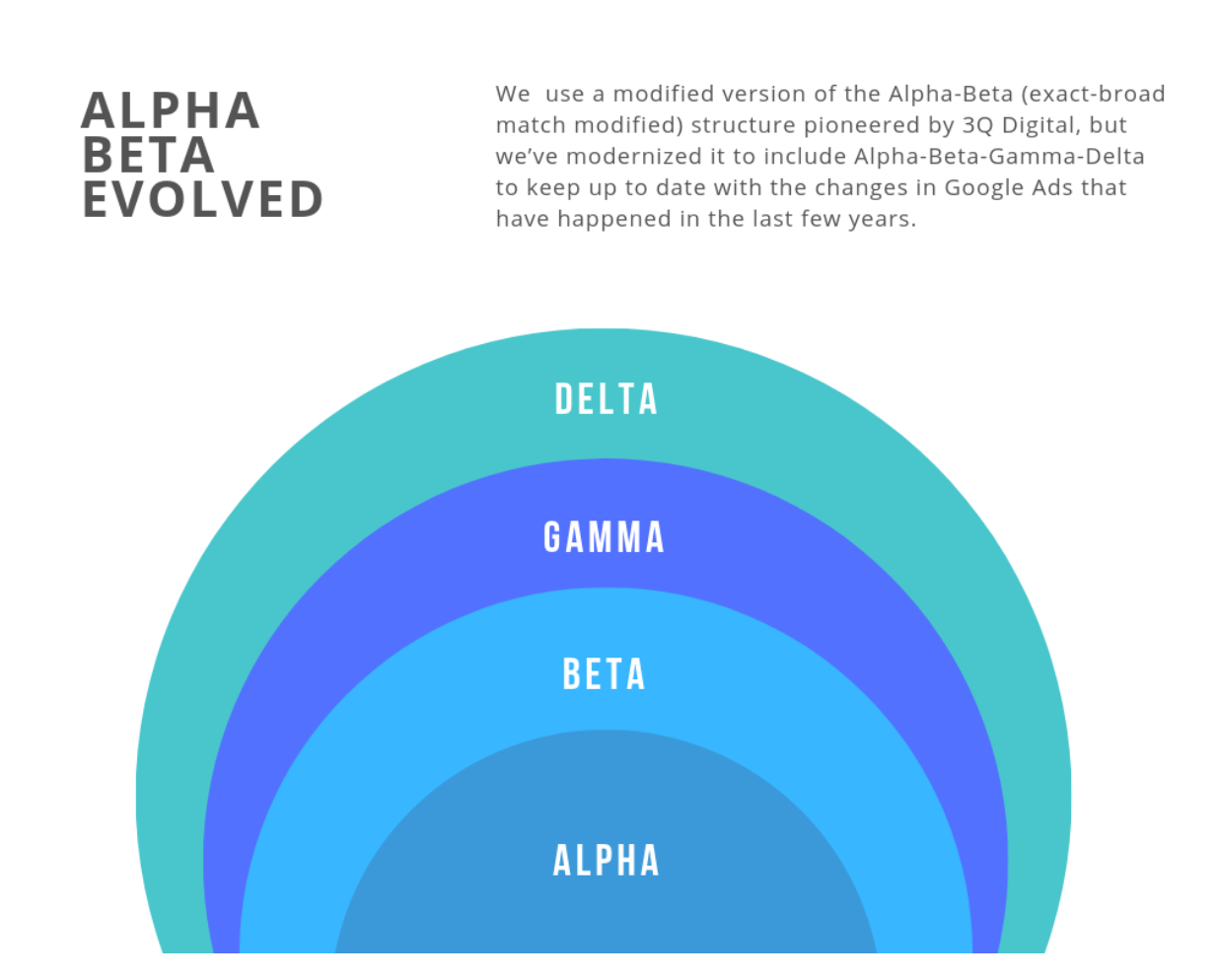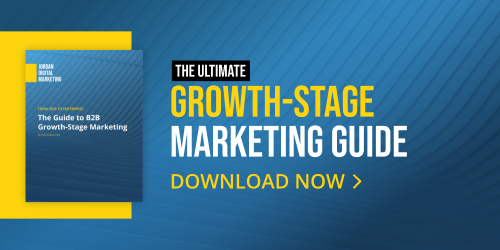Ellen Wood - JDM Impressions
Over the past few years, Google Ads has changed more than it had over the past 10 years. Expanded text ads have been sunsetted in favor of responsive search ads. Smart bidding has not only become a legitimate option; it is now outperforming most third-party bidding platforms. Dynamic search ads have really turned a corner and become usable. The watering-down of the match types with close variants is ruining everything.
Since everything is evolving, we need to learn to evolve with it—or be left behind.
What is the Alpha-Beta Structure for Google Ad Campaigns?
The Alpha-Beta (exact-broad match modified) structure was pioneered by 3Q Digital in 2010, and in its day was revolutionary. It involves creating 2 sets of campaigns: Alpha and Beta. Alpha campaigns are exact match terms, while Beta campaigns are broad match modified with the Alpha keywords added in as exact match negatives. This forces the exact match terms to the Alpha campaigns while using the Beta campaigns for discovery.
Up until that point, most people were either neglecting search term funneling between match types or doing it in an extremely manual process at the ad group level within the same campaigns. Needless to say, the simplicity and usefulness of shared negative lists with the Alpha-Beta process was dramatically more effective than having to maintain granular negative lists to funnel terms where you wanted them to go.
While the Alpha-Beta process was revolutionary, Google has evolved, and the Alpha-Beta process needs to evolve with it. At Jordan Digital Marketing, we use a modified version of the Alpha-Beta (exact-broad match modified), but we’ve expanded it to include Alpha-Beta-Gamma-Delta to reflect the changes that have happened in the last couple years in Google Ads.

Alpha Keyword Strategy
In the updated Alpha-Beta-Gamma-Delta structure, the Alpha campaign is used for keywords/queries with historically strong conversions and performance. Those keywords and queries are placed in single-keyword ad groups, and exact match is used. This allows for extremely targeted ads and bids based on performance goals and is largely unchanged from the original A-B structure.
Beta Keyword Strategy
The updated Beta campaign uses phrase match keywords in discovery ad groups to identify new, high-converting terms. In parallel, we set up a shared negative keyword list with all exact-match keywords in the Alpha campaign to ensure that we continue to funnel the top search terms to Alpha. This enables continuous keyword discovery and account expansion while preserving the targeted approach to our best keywords (this, too, is similar to the original approach, although we used modified broad match instead of the more recent phrase match in 2010).
Gamma Keyword Strategy
The transition from broad to phrase match keywords in the Beta campaign leaves us an opportunity to test more expansively. To achieve this, we build Gamma campaigns that use true broad match keywords to cast a wider net and help fuel our learnings. Note that we use Gamma campaigns in two scenarios: if Alpha & Beta are hitting goals and performing well or if we’re running into issues scaling.
After our Beta campaigns have had the chance to run for a while, we can identify high-performing terms and dual-purpose the more durable top performers for use in the Gamma campaigns. In parallel, we set up a shared negative keyword list with all Alpha (exact) match keywords in the Alpha campaign, and a shared negative keyword list with the phrase match versions of all of our Beta keywords, and apply each negative list to the Gamma campaign to ensure that we are funneling the top traffic to the top campaigns.
A note on the Gamma campaigns: since we are targeting more broadly, we typically launch them with conversion or revenue-focused bid strategies so that we can leverage Google’s machine learning on which audience is most likely to convert.
Delta Keyword Strategy
Our Delta campaigns, like our Gamma campaigns, combine strategic platform manipulation with the power of Google’s machine learning. We only launch the Delta strategy if the Gamma campaigns are performing well.
For Delta campaigns, we combine Dynamic search ads, which are useful for discovering things we never would have considered, with successful retargeting audiences to specifically pursue users who are very likely to convert. In parallel, we set up a shared negative keyword list with all Alpha (exact) match keywords in the Alpha campaign, and a shared negative keyword list with the phrase match versions of all of our Beta keywords, and apply each negative list to the Gamma campaign to ensure that we are funneling the top traffic up to the top campaigns.
Conclusion
The original goals of the Alpha-Beta strategy — target top-performing terms as granularly as possible and use other campaigns to discover new top performers — hold true in our Alpha-Beta-Gamma-Delta approach. Our updated version allows us to take advantage of Google’s more recent match types and machine learning to put the full power of the platform to work.
Need help with your Google Ad strategy? Request an audit with our team of advertising pros today!
Tags:

Oct 14, 2019 9:00:00 PM



-Feb-02-2026-08-01-41-1973-PM.png?width=500&height=500&name=Regular%20Blog%20Hero%20(1)-Feb-02-2026-08-01-41-1973-PM.png)

